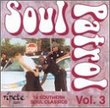| All Artists: Bechara El Khoury, Vladimir Sirenko, National Symphony Orchestra of Ukraine Title: El-Khoury: Orchestral Works Members Wishing: 0 Total Copies: 0 Label: Naxos Original Release Date: 1/1/2002 Re-Release Date: 10/22/2002 Genre: Classical Style: Symphonies Number of Discs: 1 SwapaCD Credits: 1 UPC: 747313204328 |
Search - Bechara El Khoury, Vladimir Sirenko, National Symphony Orchestra of Ukraine :: El-Khoury: Orchestral Works
 | Bechara El Khoury, Vladimir Sirenko, National Symphony Orchestra of Ukraine El-Khoury: Orchestral Works Genre: Classical
|
Larger Image |
CD DetailsSimilar CDs
|
CD ReviewsBouncing tragic Boulez Jacques COULARDEAU | OLLIERGUES France | 10/30/2007 (5 out of 5 stars) "`Drammatico'. There could be some continuity in these ruins but what seems to remain, standing, is nothing but tidbits of small chips of music. Half a clause, one sudden interjection, a small partially broken up sentence that has lost its meaning but reverberates in the vast emptiness of the abyss of death. And yet the ruins are squirming and wiggling with unseen life. But is it life itself or the phantom of life? But this life was multifarious, the crossing and mixing of all influences and all original trespassing of all rules or norms. And the ruinous reality today sounds like the normal and foreseeable frontal clash of all these heritages that had been in a way forced to promiscuity. What survives then is like a hodgepodge of what used to be, a patchwork of one thousand tongues and languages, with maybe a small iota too much American jazzy symphonic music. We can wonder what some Gershwinian or Bernsteinian accents are doing in this churchyard, that cemetery. That is the mystery of these ruins. Or is the mystery the bringing together and resuscitating of all these morsels and crumbs back into some loaf of unleavened bread that announces a new Easter, a new epiphany, a new assumption to the sky of tomorrow morning, though it is always already yesterday. Are we beyond time's redemption? Have we participated in the getting rid of the past, of the Messiah of some newly not yet invented peace in the Middle East? The violin of `Poetico' is so airy, eerie, so sadly cloudless and yet some deep bass is lurking behind all the fallen stones, ready to take them all to the rising sunshine of the aftermath of the disaster, the `tragique' of the unstoppable pursuing of one deadly aim against all such influences. Let's close the door of the past but it all seeps under the door and the past is back inside the crumbling house. `Colline de l'Etrange' is digging deep in out several century old heritage. Accents from the good old romantic 19th century, Berlioz or many others. Some light echo of Stravinsky's early un-harmonic harmony, and then everything flutters in and out, each instrument being its own recollection, its own remembrance. We are in a cedar forest of pillars, trunks, and many branches of the trees bend down in front of `Harmonies crépusculaires' that leads down to the tenebrae of some nightful tomb, grave and funeral vault with a distant drum marching the army of the dead through to the long pilgrimage of salvation, if it is not rather total perdition. A bell tolling in the middle of the rebellion of history. How can only a totaling bell survive this catastrophe of oblivious utter destruction? It's because the clouds have drawn their wine and are now sprinkling it or even pouring it over the land like blood over the battle field. And nothing germinates out of it except some disturbing rumor or lianas that little by little encircle our ears and enchain us to our stools, as if we were the stool pigeons of death or as if we were condemned to take stool after stool till we died of total loss of internal matter. But isn't a battle surging up from that liquefied existence? It is deep, and lurking, and menacing and even coming down at times like a rolling bulldozer that would like to bring everything down. The cloud is no longer water droplets suspended in mid air but lead bullets falling onto us like the familiars if death or starving children.
Dr Jacques COULARDEAU, University Paris Dauphine, University Paris 1 Pantheon Sorbonne & University Versailles Saint Quentin en Yvelines " |

 Track Listings (7) - Disc #1
Track Listings (7) - Disc #1
